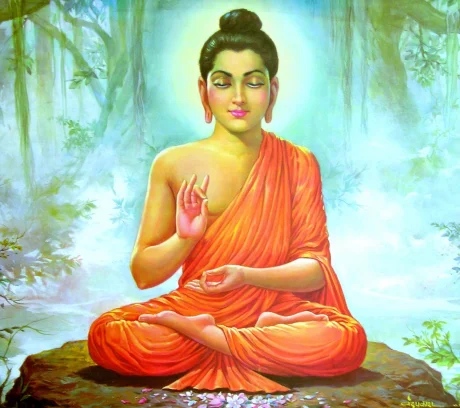BUDDHA There are many Siddhas, Buddhas and Nathas….. (Japu, p. 7) The word Buddha seems to have been used for Gautama Buddha, the founder of Buddhism.Mythologically, he was accepted in Hinduism as the ninth incarnation of Vishnu. His great success as a religious teacher seerns to have induced the Brahmin savants to adopt him as their own. As Vishnu\’s ninth incarnation he encouraged the wicked people to hate Vedas, reject the caste as well as the gods in order to hasten them to their destruction. See : Das Avatars (Buddha)
References :
1. Kohli, Surindar Singh ed, Dictionary of Mythological References in Guru Granth Sahib, 1993
Buddha
In Hinduism, Buddha is often regarded as the ninth avatar of Vishnu in the Dashavatara (ten principal incarnations of Vishnu). This interpretation is primarily found in Vaishnavite traditions and texts like the Bhagavata Purana and Vishnu Purana. Here are some key aspects:
Role as an Avatar:
- Buddha is believed to have incarnated to guide people away from animal sacrifices and to promote non-violence (ahimsa). His teachings are seen as a way to restore dharma (righteousness) during a time of moral decline.
- In some interpretations, Buddha’s incarnation is also viewed as a test for those who misuse the Vedas, leading them away from the path of truth.
Symbolism:
Buddha represents compassion, wisdom, and the pursuit of enlightenment. His teachings emphasize ethical living, meditation, and liberation from suffering.
While many Hindus revere Buddha as an avatar of Vishnu, others see him as a distinct spiritual teacher. This reflects the historical interplay between Hinduism and Buddhism.
Buddha in Guru Granth Sahib
In Sikhism, Buddha is acknowledged as a historical and spiritual figure, but he is not worshipped as an avatar or deity. The Guru Granth Sahib references Buddha in a philosophical context:
Mentions in the Guru Granth Sahib:
- Buddha is mentioned alongside other spiritual figures like Gorakh and Ram to emphasize the universality of divine wisdom. For example:
- “Brahma, Vishnu, Shiva, Gorakh, and Buddha contemplate the Lord, but they cannot find His limits” (Maru Kabir, p. 103).
- These references highlight the limitations of even great sages and deities in fully comprehending the infinite Creator (Ik Onkar).
Philosophical Context:
- Sikh teachings use Buddha as a metaphor for spiritual wisdom and the pursuit of truth. However, they emphasize that true realization comes from meditating on God’s name (Naam) and living a righteous life.
Confluence of Traditions
While Hinduism venerates Buddha as an avatar of Vishnu, Sikhism acknowledges him as a wise teacher and uses his story to convey spiritual lessons. Both traditions recognize his contributions to ethical and spiritual thought.





